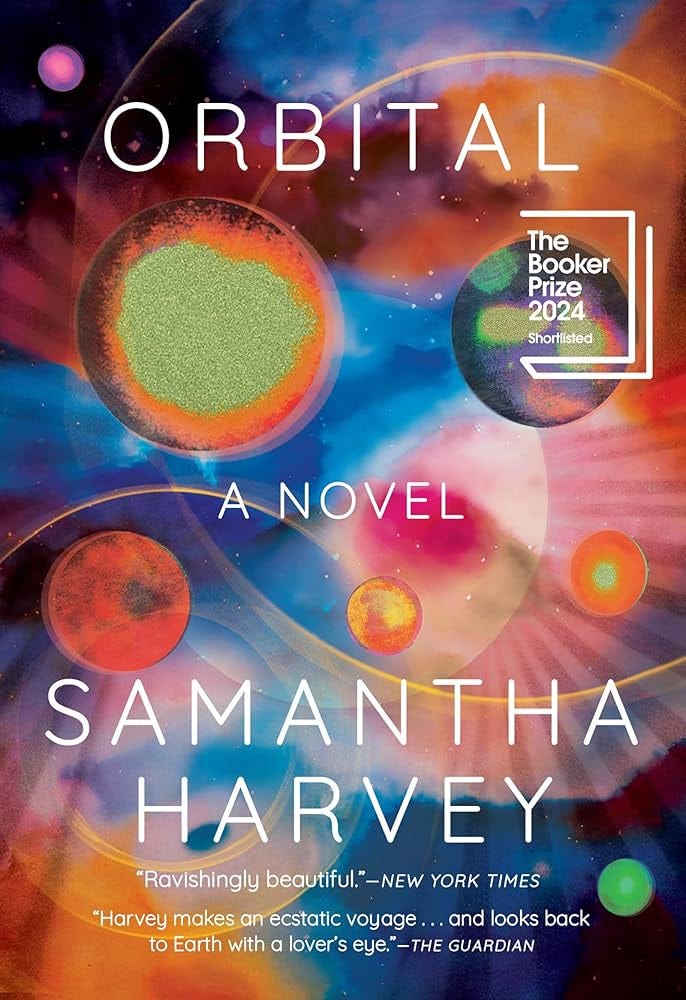“Nine months of this weightless drifting.
Nine months of this sardine living.”
— Samantha Harvey, Orbital
Dear Readers,
I have a steady routine. I write in the morning and I run in a big circle in the afternoon.
Keeping to a tight physical schedule is how I give my brain the space to wander.
The time I leave the house for my run changes throughout the year, about 2 hours before sunset. Today I plan to leave at 4:37 p.m. By the time the shortest day of the year rolls around, December 21, I’ll launch at 2:44 p.m.
I have an orbit.
The repetition means seasonal changes feel significant — including this major event, the sun now sets over the train tracks.
I was thinking about running in a circle on a spinning globe as I listened to Orbital by Samantha Harvey. It was recently short-listed for The Booker Prize.
This novel is about the inner lives of six astronauts. It answers the questions I’ve always wanted to know — what does it feel to be in space, what do you think when you look out at the earth, how do you sleep, and what happens when you brush your teeth?
The brilliance of this book lies in how it balances the big with the small. The astronauts watch the sunrise 16 times a day, “every single one staggers them.” They are humans with a godly view.
At the same time, they are trapped in a tight place, a tin can, negotiating life with others, cleaning air filters, clipping nails, catching globs of toothpaste, and eating freeze-dried macaroni. Their life is confined and mundane.
As the astronauts go about their business, one will stop to think: I’m in a ship in the middle of a vacuum — what am I doing? All six have different answers.
The astronauts hang like bats in their sleeping quarters. One struggles physically, “everything in his body seems to lack commitment to the cause of its animal life.”
The spaceship is described in fragile detail, scraps of metal and brittle glass. Though the ship constantly monitored, there is a precariousness to trusting life to a contraption. As the author astutely points out, on earth we move around in a body that is similarly fragile but, by comparison, largely unmonitored.
Don’t read this for the plot. This is a book of ideas and impressions. It’s special because it brings space to an earthly realm. We all orbit.
While reading it, you might, for example, stop running for long enough to notice the position of the sun over the train tracks.
The ordinary can be extraordinary. Orbital has stayed me. I hope you love it, too.
Happy reading,
Claire
P.S.
In The Globe & Mail: Home Children [Gift link] — Assembled from more than 40 articles by historians, scholars, journalists and the descendants of more than 100,000 children sent from Britain to Canada between 1869 and the 1940s.
The CBC ran an excerpt of my next book, How to Survive a Bear Attack (out March 2025). You can preorder.
One of my favourite novels of the last few years, Small Things Like These by Claire Keegan, will be coming to theatres in November. I’ve heard it is stunning!
I read it so that you don’t have to: Character Limit: How Elon Musk Destroyed Twitter. This book is about how money can enable and destroy in equal measure. It’s incredibly well-researched, down to the text message level. Also, I’ll note that between 1944 and 1963, the top income tax rate in the U.S. was above 90%. It left me with a question — do we need billionaires?
If you came of age in the 90s in Canada, you will love No Dress Rehearsal, a documentary about The Tragically Hip. As my friend Jackie said, “it’s so nostalgic, it aches.”
This is a monthly letter, free, and about books I love. Thank you for reading!






Claire I so so loved reading Orbital and the journey it took me, perspectives it gave me. It has enriched my life and writing in so many ways. As you said, it beautifully mixes the big and the small. It’s my kind of book. And also Claire Keegan, who I think is a master of this writing style too. Thanks for the reading suggestions and very exciting about your memoir!
Great piece. thanks.